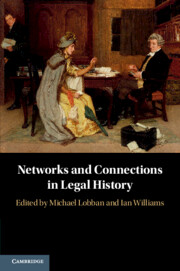Book contents
- Networks and Connections in Legal History
- Networks and Connections in Legal History
- Copyright page
- Contents
- Contributors
- 1 Introduction
- 2 Networks and Influences
- 3 Men of Law and Legal Networks in Aberdeen, Principally in 1600–1650
- 4 Calling Time at the Bar
- 5 The Thistle, the Rose, and the Palm
- 6 ‘The Bengal Boiler’
- 7 The White Ensign on Land
- 8 A Broker’s Advice
- 9 Trans-Atlantic Connections
- 10 Interpretatio ex aequo et bono
- 11 Shakespeare and the European ius commune
- 12 Law Reporting and Law-Making
- 13 John Taylor Coleridge and English Criminal Law
- Index
2 - Networks and Influences
Contextualising Personnel and Procedures in the Court of Chivalry
Published online by Cambridge University Press: 10 August 2020
- Networks and Connections in Legal History
- Networks and Connections in Legal History
- Copyright page
- Contents
- Contributors
- 1 Introduction
- 2 Networks and Influences
- 3 Men of Law and Legal Networks in Aberdeen, Principally in 1600–1650
- 4 Calling Time at the Bar
- 5 The Thistle, the Rose, and the Palm
- 6 ‘The Bengal Boiler’
- 7 The White Ensign on Land
- 8 A Broker’s Advice
- 9 Trans-Atlantic Connections
- 10 Interpretatio ex aequo et bono
- 11 Shakespeare and the European ius commune
- 12 Law Reporting and Law-Making
- 13 John Taylor Coleridge and English Criminal Law
- Index
Summary
The Court of Chivalry enjoyed a high political profile, owing to the military nature of the suits and the high social status of its litigants. Within the context of long periods of warfare during the fourteenth and fifteenth centuries, the Court maintained its reputation on account of nobles and knights wishing to challenge the legitimacy of perceived rights to lucrative ransoms of prisoners or to bear heraldic coats of arms. The procedures employed were predominantly those of the continental ius commune rather than the common law, probably on account of the international body of customs and practices found in the 'law and custom of arms' which underpinned the legal principles applied in the Court. In addition to its eclectic jurisdiction, the networks and connections of the legal personnel helped shape its distinct identity. The Court formed a nexus where highly qualified men from other courts and administrative traditions pooled their considerable intellectual understanding and practical experience. They were often educated in civil and/or canon law, but were probably both respected and well-placed from their involvement in parliament and other diplomatic and judicial business to act as commissioners and advocates in the often highly charged political circumstances of Court of Chivalry cases.
- Type
- Chapter
- Information
- Networks and Connections in Legal History , pp. 12 - 32Publisher: Cambridge University PressPrint publication year: 2020

